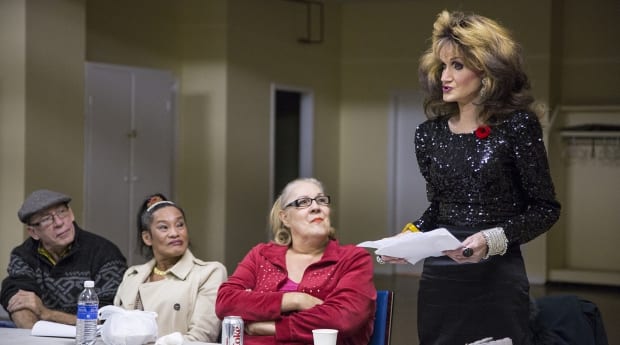Plans for a sex worker memorial — tentatively a Victorian street lamp, perhaps a bench and maybe a bronze stiletto heel — are moving ahead in the West End, where sex work flourished in the 1970s–1980s.
“We were very organized,” says sex workers advocate Jamie Lee Hamilton, who co-founded the memorial project with sociologist Becki Ross, a professor at the University of British Columbia.
“I call that era the golden age of prostitution,” Hamilton says. “We were a pimp-free zone. If a pimp came down, we’d tell him to put on some lipstick and suck cock like the rest of us.”
“We weren’t hurting anyone,” she adds. “We weren’t criminals like they made us out to be.”
Hamilton says a memorial would remember those who were part of a connected community, who are no longer alive. “We didn’t want anything sensational,” she says. “We wanted it to be something that would last forever.”
“We all worked together and supported one another,” she says.
The plan is for the memorial to be located at the southeast corner of Jervis and Pendrell streets, where many of the different sex worker strolls in the area once converged.
Hamilton and Ross organized a community meeting Nov 4 at St Paul’s Anglican Church on that same corner, for a public consultation on the proposed plans.
Former hustler Fraser Doke suggested a bench be added to the memorial. He says it would give people a place to reflect on the history of sex workers in the area.
“We were doing it as a community,” Doke says. “We did it for people. Not just for cash. People need to be respected for who they are,” he adds.
Sex workers were a visible part of the West End community until the city and courts pushed them out and began to move them around the city.
Lobbied by the Concerned Residents of the West End (CROWE), led in part by former Vancouver Centre MP Pat Carney with help from former city councillor Gordon Price, the City of Vancouver passed its Street Activities bylaw in 1982.
Hamilton says Price had been given a contract to study prostitution in the area. But, she alleges, “he had already made up his mind we were evil, vile people.”
An injunction from BC Supreme Court Justice Allan McEachern moved sex workers into the Yaletown district in 1984. Ross says McEachern called sex workers “a public nuisance.”
“The power elites backed a war on hookers,” Ross says. McEachern’s ruling was steeped in a toxic blend of “whorephobia” and a violation of their constitutional rights to be safe, she says.
The gentrification of Yaletown soon pushed sex workers into Mount Pleasant, down East Broadway and then into the Downtown Eastside.
There, activists say, people slid into despair and drug abuse, becoming perfect targets for people such as convicted serial killer Robert William Pickton.
The move to push sex workers around the city was documented in the award-winning 1984 film Hookers on Davie written by Holly Dale, who co-directed it with Janis Cole.
The budget for the memorial would be about $28,000, a similar figure to the amount sex workers were fined under city bylaws years ago.
Planning for a memorial, which would be Canada’s first tribute to sex workers, has been underway for about eight months.
City social planner Ty Mistry, whose work focuses on the needs of sex workers in Vancouver (after a recommendation from the Missing Women’s Inquiry that such a position be created), says the city supports the memorial.
She says sex workers have been treated very poorly in the past. But that has changed, she says.
Now, Mistry says, the city affirms that recognition of sex workers’ rights is pivotal to dealing with human rights violations against them.
City social planner Jessica Wood says archival research indicates how shocking the treatment of sex workers in the city has been. “The war on sex workers is very much like the war on drugs,” she says. “It has not been effective . . . it leads to nothing but harm.”
She says she supports memorials in both the West End and the Downtown Eastside.
A Downtown Eastside memorial to sex workers would need to be distinct, Hamilton says. “We can’t have this in the Downtown Eastside because of the tragedy that went on down there,” she says, referring to Pickton.
Hamilton says she approached Vancouver mayoral candidates in 2008 — Gregor Robertson of Vision and Peter Ladner of the Non-Partisan Association — about also supporting an apology for sex workers.
She says Robertson indicated he would be supportive, while Ladner told her he didn’t know what such a move would accomplish.
“We knew the mayor (Robertson) was open to the issue we were bringing forward,” Hamilton says.
Former Qmunity executive director Jennifer Breakspear attended the meeting. She says it’s important for the queer community to support sex workers who have done so much to advance the rights of the whole community.
“We won’t get there until we all get there,” she says.

 Why you can trust Xtra
Why you can trust Xtra


